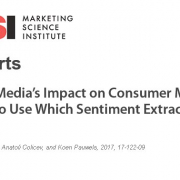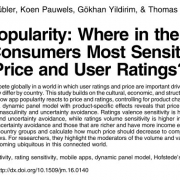MCM Students Access the Consumer's Mind - New Seminar on "User-Generated Content"

Consumers are increasingly using social media channels to share information directly with companies as well as other users, whether active or prospective customers. Every minute, social media users around the world create about half a million posts on Facebook and Twitter, watch and comment on 4.3 million YouTube videos, generate 2.4 million snaps, like 174,000 images on Instagram and search for 3.7 million terms on Google. A large fraction of this input, so-called “User-Generated Content”, potentially contains information that is of great importance for marketing managers because it can reveal how users think about a company's products, services, brands and retailers. Marketers, however, need specific tools and skills to extract relevant information from the wealth of data that social media channels provide in order to make well-founded business decisions.
In a brand new seminar by Professor Raoul Kübler, holder of the Junior Professorship of Marketing at the MCM, entitled “User-Generated Content from Social Media: Marketing's Access Point to the Consumer's Mind?”, 28 master students had the opportunity to train themselves in the field of Sentiment Analysis with regard to User-Generated Content. During the course, the participants gained a comprehensive overview of the relevant topics and processes and developed a versatile toolbox that helps marketers gather and process data from social media and identify resp. classify consumer's attitudes. Therefore, the topics ranged from data preparation and data quality to subsequent sentiment analysis (using techniques such as e.g. term-frequencies and dictionaries as well as machine learning approaches).
After the final seminar presentations at the end of April 2019, Professor Kübler was very enthusiastic about the results: “Monitoring social media channels is becoming increasingly important for marketing departments, as these procedures can effectively supplement traditional market research activities. In addition, sentiment analysis in social media has some decisive advantages. First of all, consumers can express themselves freely on the internet and thus independently of a particular survey situation. This enables marketers to collect genuine, accurate and authentic data about without artificial biases. Additionally, analyzing content from social media can be done in real-time, so that businesses may gain a decisive competitive advantage. Finally, data acquisition and evaluation is associated with low costs nowadays, especially since the prices for powerful computer technology have fallen further and further over the years”, Professor Kübler concludes.



 Um die Abwicklung von Unfallschäden zu beschleunigen, führt Control€xpert eine automatische Schadensermittlung und -regulierung mittels Big Data und Algorithmen durch. Autofahrer und Versicherungen können Fotos der beschädigten Fahrzeuge hochladen und erhalten die voraussichtlich anfallenden Reparaturkosten binnen Minuten online angezeigt. Hierfür gleicht Control€xpert die eingereichten Bilder automatisch mit einer Datenbank ab, die mehrere Millionen Fotos von Unfallwagen enthält. Versicherungen können die ermittelte Schadenshöhe anschließend mit dem Wiederbeschaffungswert des Autos vergleichen und so unkompliziert über die Schadensabwicklung entscheiden.
Um die Abwicklung von Unfallschäden zu beschleunigen, führt Control€xpert eine automatische Schadensermittlung und -regulierung mittels Big Data und Algorithmen durch. Autofahrer und Versicherungen können Fotos der beschädigten Fahrzeuge hochladen und erhalten die voraussichtlich anfallenden Reparaturkosten binnen Minuten online angezeigt. Hierfür gleicht Control€xpert die eingereichten Bilder automatisch mit einer Datenbank ab, die mehrere Millionen Fotos von Unfallwagen enthält. Versicherungen können die ermittelte Schadenshöhe anschließend mit dem Wiederbeschaffungswert des Autos vergleichen und so unkompliziert über die Schadensabwicklung entscheiden.
 In the paper the international team contrasts different state of the art tools to measure text-based sentiment such as machine learning based bottom up approaches (i.e. support vector machines) and dictionary based top down approaches (i.e. Linguistic Inquiry Word Count) and compares them with traditional volume metrics such as the amount of likes, comments and shares. The study identifies multiple contingency factors that determine in which industries and in case of which mindset metrics the different tools predict best.
In the paper the international team contrasts different state of the art tools to measure text-based sentiment such as machine learning based bottom up approaches (i.e. support vector machines) and dictionary based top down approaches (i.e. Linguistic Inquiry Word Count) and compares them with traditional volume metrics such as the amount of likes, comments and shares. The study identifies multiple contingency factors that determine in which industries and in case of which mindset metrics the different tools predict best.




